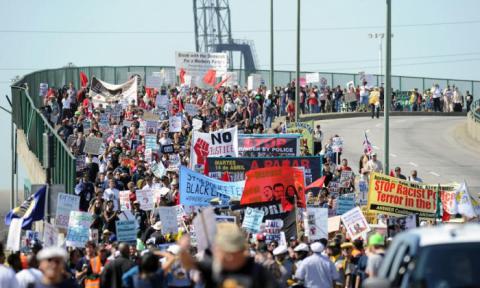Thousands of Americans set out to march under the banners of “black lives matter” and “no justice no peace” on Friday, merging the movement against police abuses with May Day’s 124-year crusade for workers’ rights.
In New York, thousands rallied in downtown Manhattan, demanding “disarm the NYPD” in the wake of the police killings of Freddie Gray in Baltimore and other black men around the country.
Protesters also called for a minimum wage hike to $15, restrictions on carbon emissions and an end to tax loopholes for the wealthiest Americans.
“The thing about racial justice, and the reason that the movement has space for the fight for 15 [dollar minimum wage] and workplace issues is that we’re all people, and this is a people problem,” said Sabaah Jordan, an organizer who did not plan the May Day events but said she would take part.
“Black people are workers too, and the racism and injustice that we see in the police we have to deal with in the workplace too,” she said. “When we say ‘black lives matter’, we’re really addressing justice, not just with police.
“Racial exploitation is a critical issue, and confronting it is really creating a society for everyone. ‘Black lives matter’ is a sweeping statement.”
The rally paused in major parks and squares, where participants made special calls for immigrant workers’ rights and the prosecution of police officers who have killed unarmed black men in recent years. University students also gathered at the Guggenheim to “occupy” the museum and protest against brutal working conditions in Abu Dhabi, where the museum plans to build an expansion.
Police dispersed a group of 30 or 40 protesters who demanded that the museum’s trustees hear their concerns. About a dozen remained, forming a small circle in the museum’s lobby in a standoff with two officers. Andrew Ross, one of the organizers, said that they wanted workers to have the right to organize without fear of retaliation, and that workers had been deported for speaking out.
New School student Viannie Bell, 25, said she wanted to learn as much about the cause as possible. “I believe in advocacy,” Bell said. “I believe that we should advocate for those whose voices can’t be heard. I believe in fair treatment and fair wages.”
New York University students also planned a sit-in on their campus to protest against the treatment of workers at NYU’s Abu Dhabi campus, near where protesters planned to “shut it down for Freddie Gray” in Union Square in the evening. Earlier on Friday state attorney Marilyn Mosby said that the six officers involved in Gray’s death will face criminal charges in Baltimore.
In Los Angeles, immigrants’ rights took top billing alongside the campaign against police killings in two parallel marches, the Full Rights March and the International Workers’ March. Police cordoned off wide swaths of the city to accommodate the massive crowds.
Jorge-Mario Cabrera, a spokesman for the Coalition for Humane Immigrant Rights of Los Angeles, said that the the union of movements was a natural fit. “We’ve been engaging with local groups to really look at what are some of the commonalities of the two struggles,” he said. “Immigrant community folks are detained and beat up too; mass incarceration isn’t anything new to both of our communities.
“We want to make sure that that’s understood and make it understood that we can’t do this alone.”
Farther north, the San Francisco longshore union declined to work the ports of the Bay Area, calling for a march through Oakland. In a statement, ILWU Local 10 said its members were “outraged by the recent escalation in police brutality throughout the US that has resulted in the needless killing of innocent and unarmed minorities”.
“The rich have begun colonizing North Oakland, West Oakland, and Downtown,” a Facebook post for the event reads, decrying “their tech buses, their pricey cafes, and their luxury apartments.
“Let them know that they are not welcome, that their high-priced world is not welcome, and their terrible world of surveillance and alienation must end,” the post continues. Teamster bus drivers pleaded with the protesters not to disrupt traffic, and the protest appeared to fizzle out. Attendee Andrew James Rahman complained that the buses were simply re-routed and the protest was disorganized.
But hundreds came out for organized marches in Philadelphia, Boston and Detroit, where organizers made diverse appeals for an end to water shutoffs, tax foreclosures and tax loopholes. In Chicago, the city that inspired the occasion, the city’s May Day Radical Coalition exhorted “all anti-capitalists, radical unionists, anarchists, socialists and working class militants to come to the march” starting at the city’s Union Park.
International Workers’ Day was created to commemorate the 1886 Haymarket riot, when a peaceful workers’ strike turned into a violent clash with officers after someone threw a bomb at police; eight anarchists were convicted for murder afterward.
Alan Yuhas is a reporter for the Guardian US. You can follow him on Twitter @alanyuhas Jana Kasperkevic is a reporter for Guardian US. Follow her on Twitter @kasperka


Spread the word